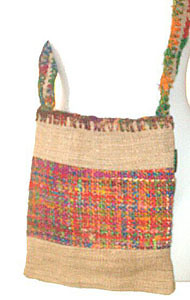Big Bill Broonzy was no totebagger. When asked for his definition of "folk song," he said, "I guess all songs is folk songs — I never heard no horse sing 'em." Isn't then all music "world music"? Sun Ra aside, is there more than one world that music is coming from? Shouldn't we scrunch our noses at anyone talking about their passion for "world music" in the same way we would at someone telling us about "audible music," or "sequential music"? You'd think, right? But no. "World Music" is a genre, a way of life, a badge and a tote bag. To see this we must note that not all totebaggery is yuppie totebaggery: there is also hemp-totebaggery. Side by side in Starbucks sit the latte and chai drinkers; on one iPod may be Norah Jones and on the other it is Sounds of the Peruvian Rain Forest, but each is pulled from a tote bag.

My first experience with hemp-totebaggery was in college, when I made the mistake of pronouncing the name of Daniel Ortega's country as NICK-A-ROG-WA. Turns out that I was not only mispronouncing it, but was also disrespecting the sons and daughters of revolution, not to mention Spanish-speaking peoples in general, of which there turn out to be a lot (or so I was told by my serape-clad classmate from Grosse Point or Atherton, I forget). The correct pronunciation, I learned, is NEEEEE-HA-RRRRAH-HUWA. I followed suit. In fact, I then endeavored to give authentic pronunciation to all place names. But I soon learned that referring to Germany as "Deutschland" just didn't carry the same kind of moral currency, to say the least.
There is a similar double-standard at work in the very notion of "world music." Music from other cultures? Well ... "other"? Let's not go there. Non-American? No, I don't think we're talking about Robbie Williams or Led Zepplin. Yet plenty of "British Isles" musics make the rubric. Once you disqualify popular music and elevate "folk" music, all of these very progressive people listening to "world music" shows on NPR affiliates and college radio stations suddenly resemble 19-century anthropologists in their interest in what is "native."
What makes a world music totebagger a totebagger isn't the interest in other cultures, or even the ultimately condescending interest in "folk" or "native" cultures, but the fact that the interest is not interest in music at all, but rather a kind of armchair adventure travel experience. It's the hemp version of Condé Nast Traveller in audiobook form. Someone might be interested in compound time-signatures, fast dance tempos, and major-second harmonies. In that case, it would make perfect sense for him to be drawn to the music of
Ivo Papasov, a Bulgarian musician. They might also then be interested then in certain forms of jazz, progressive rock, and Bartok. But what's the common thread between this music and, say, Rai, Tuvan throat singing, and Carnatic music?
Is it lost on anyone at all that what counts as "world music" is almost always the music of cultures that guilt-ridden white suburbanites perceive as "oppressed"? This is the secret to the success of those Peruvian guys (if they really are Peruvian) who are found in all major cities in what must be some sort of franchise operation. You know the ones. You've seen people put down their tote bags and clap their hands in time to these bands for a minute before dropping some change in the hat and rushing back to the SUV, having been reminded that their undocumented Dominican nanny needs a ride to the train station.
Good times, good times.

